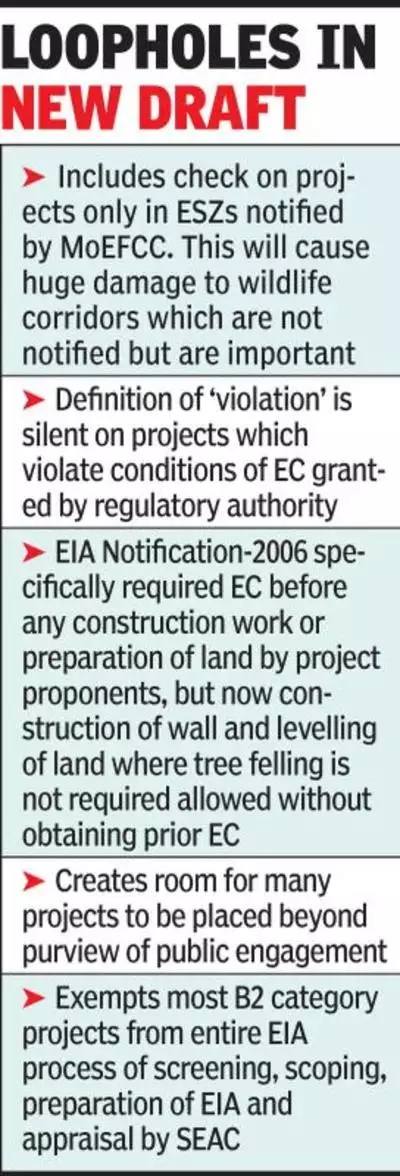Vijay Pinjarkar | TNN | May 1, 2020, 04:36 IST
 Draft EIA Notification-2020 significantly dilutes the provisions of EIA Notification-2006, not only ignoring precautionary principles but also violating principles of natural justice and fundamental right to life guaranteed under Article 21 of the Constitution. The draft is detrimental to wildlife, forest and environment protection, experts have said.
Draft EIA Notification-2020 significantly dilutes the provisions of EIA Notification-2006, not only ignoring precautionary principles but also violating principles of natural justice and fundamental right to life guaranteed under Article 21 of the Constitution. The draft is detrimental to wildlife, forest and environment protection, experts have said.Experts at the Vindhyan Ecology & Natural History Foundation, a research-based organization, who reviewed the new draft and submitted their views to the MoEFCC, said it proposes to regularize industries which have commenced operations without obtaining prior EC.
Environmental policy expert Debadityo Sinha said, “The new draft categorizes many projects as B2 category (without any screening by the expert committee), which are exempted from the mandatory process of screening, scoping, preparation of EIA, public consultation and appraisal by the State Expert Appraisal Committee (SEAC).”
“Only building and construction projects are proposed to be placed before the appraisal committee while applications for prior EC for all other B2 projects will be straightaway decided by a regulatory authority without referring the same to the SEAC,” Sinha said.
Parul Gupta, a Delhi-based environment lawyer, said, “All expansion proposals of existing projects having prior EC are proposed to be granted standard Terms of Reference (ToR) within seven days of application, with an option to EAC to prescribe additional ToR within 30 days. It doesn’t have any provision to reject expansion project by EAC. This will lead to expanding projects without critical scrutiny.”
She added, “The draft EIA allows collection of baseline data as old as three years. It further makes it discretionary for the regulatory authority to send an application for scoping or not. Earlier, scoping was mandatory and EIA studies were allowed to start only after grant of ToR.”
Preeta Dhar, environmental litigation and policy research expert, said, “The draft proposes to regularize industries which have commenced operations without obtaining prior EC. Granting post-facto EC is against the precautionary principle, which is the sole basis and objective of EIA regulations.”
“The draft also proposes to relax the half yearly compliance reports by project proponents to yearly. A penal provision for non-submission of self-compliance reports is also prescribed at a meagre amount of Rs500, Rs1,000 and Rs2,500 per day for projects under B2, B1 and A category respectively,” Dhar added.
The draft ignores ecology completely and has maintained the focus only on air and water pollution. The ‘general conditions’ (when a project falling within a certain distance from boundaries of such areas will be appraised as Category A) only includes protected areas and notified Eco-Sensitive Zones (ESZs).
“It doesn’t include ecologically significant areas protected under Indian Forest Act (IFA) 1927, Wetland Conservation and Management Rules 2017, CRZ Notification 2019, and Island CRZ Notification-2019, which need equal attention and cover habitats of various wildlife,” says Parul Gupta.
Sudhanshu Kumar, expert on environmental science & technology, said, “The draft 2020 exempts all B2 projects from the applicability of ‘general conditions’ and various other items in the Schedule viz secondary metallurgical industry, synthetic organic chemicals, highways, expressways, multimodal corridors or ring roads, common effluent treatment plants, building construction, elevated roads or stand-alone flyovers or bridges. Under the 2006 notification, the exemption was granted only for building constructions and area development projects.”
In many cases, the land for proposed project or activity involves ecologically fragile areas, corridors, wetlands, grasslands, floodplains, hills, scrubland, desert etc, where trees may not be there necessarily but any construction or levelling such land could lead to damage to ecosystem habitats and wildlife corridors.
Kumar said the new draft exempts applicability of ‘general conditions’ to projects. This implies that any new or expansion proposal of highways, even if proposed near or within ESZ or near PAs, will not be appraised by central government or treated as A category irrespective of their size and magnitude.
Under the EIA Notification 2006, ropeway projects located at altitude of 1,000 metres and above and all projects located in notified ESZ are treated as Category A projects. All other projects under ropeway were treated as Category B2. Under the 2020 draft only projects located in notified ecologically sensitive areas are listed as Category B2. Other projects do not require any prior EC whatsoever.
The 2020 draft has exempted about 40 different project activities from the requirement of any prior EC. This includes many projects with significant environmental impacts such as solar thermal power and photo-voltaic plants, extraction of earth for linear projects etc. The draft also treats all projects under inland waterways as Category B2.
“This, along with the fact that maintenance dredging is exempted from the requirement of prior EC, would put beyond scrutiny the severe ecological and social impact of any dredging on rivers. This is particularly relevant since 111 river systems are declared as National Waterways with 106 of them declared for the first time in 2016,” says Sinha.
LOOPHOLES IN NEW DRAFT
- Includes check on projects only in ESZs notified by MoEFCC. This will cause huge damage to wildlife corridors which are not notified but are important
- Definition of ‘violation’ is silent on projects which violate conditions of EC granted by regulatory authority
- EIA Notification-2006 specifically required EC before any construction work or preparation of land by project proponents, but now construction of wall and levelling of land where tree felling is not required allowed without obtaining prior EC
- Creates room for many projects to be placed beyond purview of public engagement
- Exempts most B2 category projects from entire EIA process of screening, scoping, preparation of EIA and appraisal by SEAC

